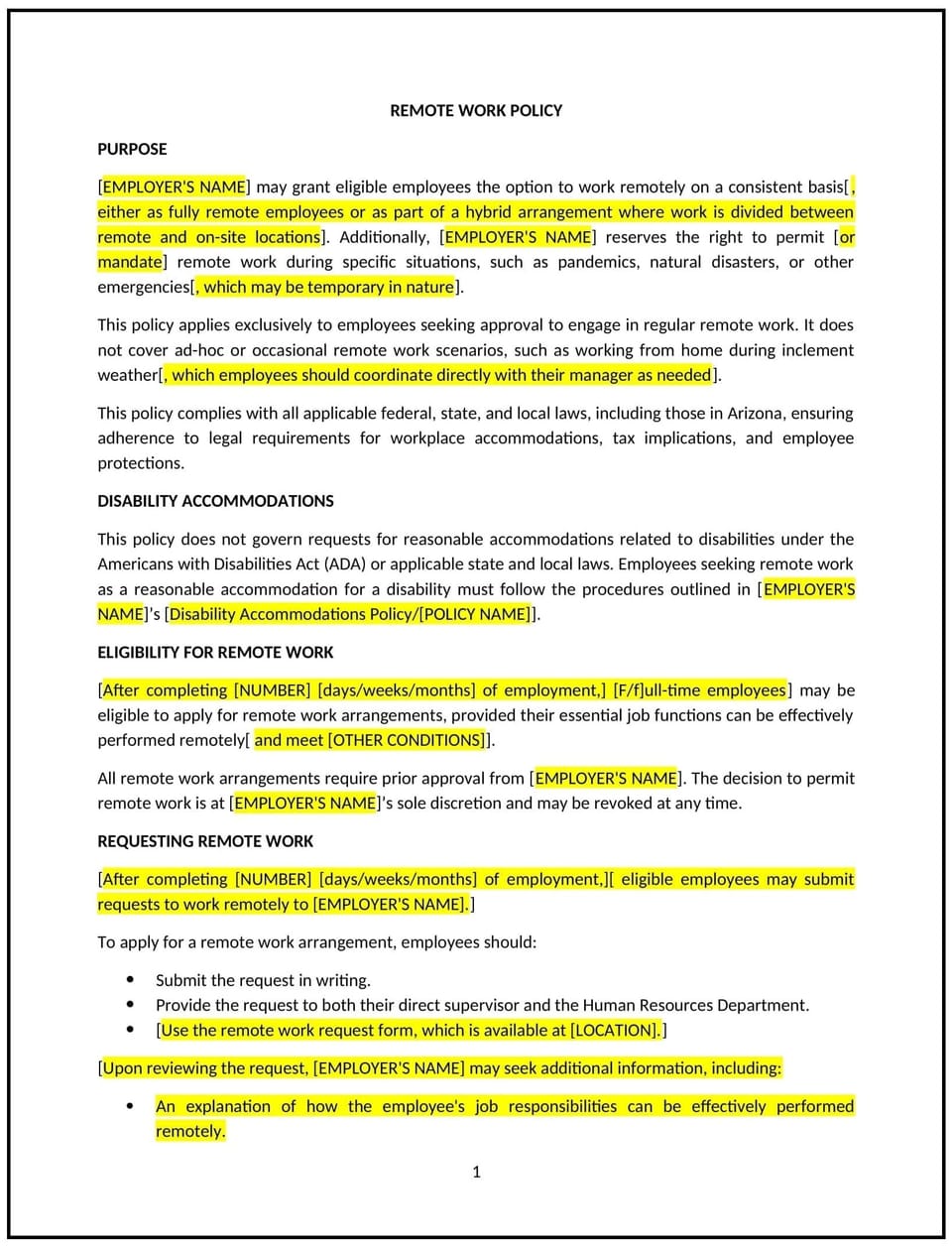Remote work policy (Arizona): Free template

Remote work policy (Arizona)
In Arizona, a remote work policy provides businesses with clear guidelines for employees who work from home or other off-site locations. This policy helps establish expectations for performance, communication, and work environment while ensuring compliance with Arizona labor laws and promoting a productive work culture.
This policy outlines eligibility for remote work, required tools, communication expectations, and performance metrics. By implementing this policy, Arizona businesses can offer flexibility to employees while maintaining operational efficiency and ensuring fair treatment.
How to use this remote work policy (Arizona)
- Define eligibility: Specify which employees or job roles are eligible for remote work, considering factors such as job responsibilities, performance, and business needs.
- Set expectations for communication: Outline expectations for how remote employees should communicate with managers and colleagues, including response times, meeting attendance, and collaboration tools.
- Provide required tools and equipment: Clarify the company’s responsibility for providing necessary tools, such as laptops, software, or access to company systems, and employees' responsibility for maintaining their work environment.
- Establish performance metrics: Define how remote employees' performance will be evaluated, including key performance indicators (KPIs), deliverables, and productivity expectations.
- Address security measures: Specify how remote employees should ensure the security of company data, including using secure networks, encryption, and compliance with data protection regulations.
Benefits of using a remote work policy (Arizona)
This policy offers several advantages for Arizona businesses:
- Promotes flexibility: Offers employees the ability to balance work and personal life, potentially improving job satisfaction and retention.
- Supports productivity: Provides clear guidelines for remote work, ensuring employees remain accountable and perform at a high level.
- Reduces overhead: Decreases the need for office space and utilities, leading to cost savings for the company.
- Enhances talent acquisition: Enables businesses to hire employees from a wider geographical area, increasing access to top talent.
- Ensures compliance: Aligns with Arizona labor laws and federal regulations, ensuring fair treatment of remote employees.
Tips for using this remote work policy (Arizona)
- Address Arizona-specific considerations: Reflect the state's unique work environment and any regulations that apply to remote or hybrid workers.
- Provide training: Offer remote work training to employees, ensuring they understand company expectations, communication tools, and security protocols.
- Monitor performance: Regularly check in with remote employees to assess progress, provide feedback, and ensure they have the resources they need to succeed.
- Use technology: Leverage collaboration tools, project management software, and secure communication channels to support remote work.
- Review periodically: Update the policy to reflect changes in technology, company operations, or state and federal labor regulations.
Q: Who is eligible for remote work under this policy?
A: Eligibility is typically based on job roles and performance. Employees whose roles can be performed remotely without impacting productivity may qualify for remote work.
Q: What tools and equipment are provided for remote workers?
A: The company provides necessary equipment, such as laptops, software, and access to systems, while employees are responsible for maintaining a productive and secure home office environment.
Q: How will remote employees be evaluated?
A: Remote employee performance will be assessed based on clearly defined metrics, such as meeting deadlines, achieving KPIs, and maintaining communication with the team.
Q: What security measures should remote employees follow?
A: Remote employees must use secure networks, comply with data protection policies, and ensure that company data is not shared or accessed by unauthorized individuals.
Q: Can remote work be revoked?
A: Yes, remote work arrangements may be modified or revoked based on business needs, employee performance, or changes in company policy.
This article contains general legal information and does not contain legal advice. Cobrief is not a law firm or a substitute for an attorney or law firm. The law is complex and changes often. For legal advice, please ask a lawyer.


